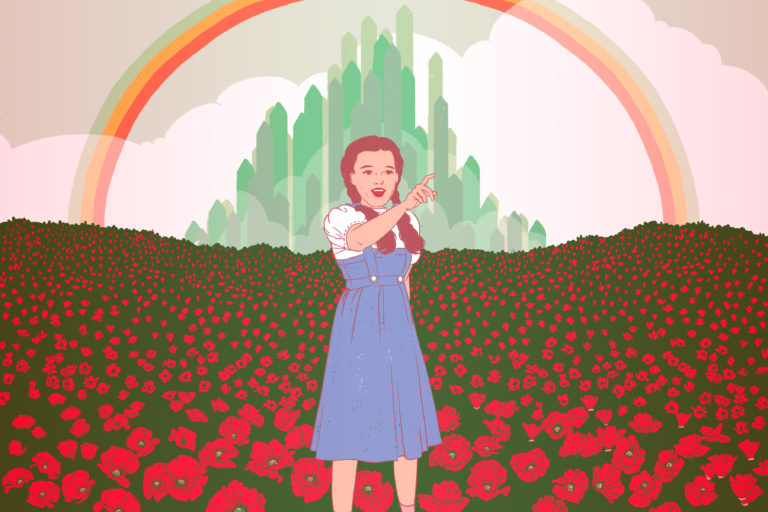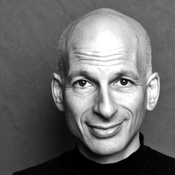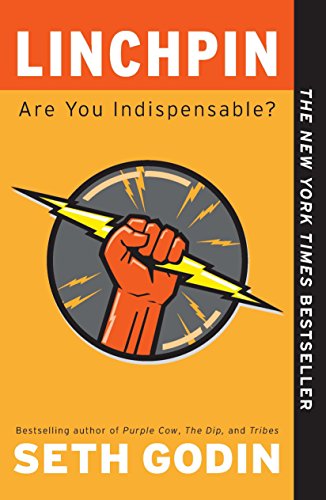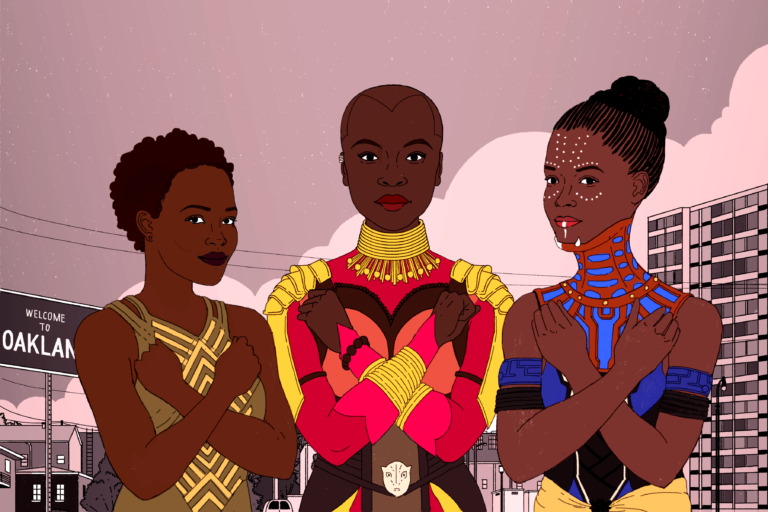Seth Godin
The Wizard of Oz
The Wizard of Oz is one of the most watched films of all time. When a tornado whisks Dorothy and her dog Toto from their Kansas home to the magical Land of Oz, Dorothy has to seek out its wizard to find a way home. Along the way, she makes new friends and encounters all sorts of obstacles — all made delightful by the movie’s iconic original music and use of color, which was groundbreaking at the time. Entrepreneur Seth Godin says the movie made a strong impression on him as a child: Seeing a young person take action inspired him to do the same. “It’s up to us,” he says, “and we could do it if we wanted to.”

Image by Julia Kuo, © All Rights Reserved.
Guest

Seth Godin writes the wildly popular daily, Seth’s Blog. His podcast is Akimbo. He’s the author of many best-selling books, online and in print, including This is Marketing, Purple Cow, The Dip, and Linchpin. In 2018 he was inducted into the Marketing Hall of Fame.
Transcript
Lily Percy, host: Hello, fellow movie fans. I’m Lily Percy, and I’ll be your guide this week as I talk with Seth Godin about the movie that changed his life, The Wizard of Oz. If you haven’t seen it — or can’t really remember it — don’t worry. We’re going to give you all the details to follow along.
[music: “Over the Rainbow” by Judy Garland]
Chances are, if you grew up in the United States, you’ve probably seen The Wizard of Oz. Maybe you didn’t rent it, maybe you saw it at school, or maybe it was just playing constantly on TV like it was in my house. But either way, it’s one of those iconic American movies that is referenced by several other movies — and also, according to the Library of Congress, is the most seen movie in movie history.
[excerpt: The Wizard of Oz]
[music: “Crystal Gazing” by The MGM Studio Orchestra]
But in case you haven’t seen The Wizard of Oz, here’s what’s going on in the movie. There’s a little girl named Dorothy, played by Judy Garland, her dog Toto, and a tornado has just hit the farmhouse in which they live, somewhere in Kansas. They’re transported to this magical land, where witches exist and the great Wizard of Oz rules all over the land, and Dorothy and Toto follow the yellow brick road toward Emerald City to try and find their way back home. Along the way, they meet a scarecrow that needs a brain, a tin man that’s missing a heart, and a cowardly lion who wants courage.
[excerpt: The Wizard of Oz]
I have to be honest, The Wizard of Oz has never been a movie that I understood. My father used to watch it every year when they would show it on TV, and all I remember was falling asleep during it. So for me going into this conversation with the great entrepreneur and wise man Seth Godin, I was really perplexed. I wanted to understand what it was about this movie that I was missing and after hearing him talk about it, I went back and rewatched it, and I think I finally get it.
[music: “If I Only Had a Heart” by Jack Haley]
[excerpt: The Wizard of Oz]
[music: “Leaving Munchkinland” by The MGM Studio Orchestra]
On the surface, this movie is about a little girl who gets lost in her imagination and all these things that are foreshadowing things in her own life on her farm in Kansas. But then they’re all these other layers and a lot of depth to the characters in the movie that I never would have seen without Seth Godin’s help. The biggest idea that I now take away from The Wizard of Oz is one that continues to drive him: It is up to us, and we can do it if we want to.
Ms. Percy: you back in time, time-travel together with you, by asking you to close your eyes and, for ten seconds, think about the first time that you saw The Wizard of Oz. Think about how old you were, where you were, how it made you feel. And then I’ll chime in when the ten seconds are up.
So what memories came up for you then?
Mr. Godin: Oh, quite a chill of memory and nostalgia there. In 1966, my parents bought a color TV. And I’m pretty sure it was February, and we were sitting in the living room, and it was the annual showing of The Wizard of Oz. And that movie, of course, begins in black-and-white and sepia tones and then transfers to color. And as somebody who didn’t grow up with color TV, that was an extraordinary thing.
But mostly, my memory is that feeling of safety with mom and dad and my two little sisters, sitting in our little house in Buffalo, New York, watching this miracle happen on TV in front of us. And I’ve probably seen it ten times, 15 times since then, like everybody else. And one of the reasons that The Wizard of Oz is such an important movie is that we’ve all seen it, and so it becomes —
Ms. Percy: It’s a touchstone.
Mr. Godin: A touchstone; exactly.
[music: “Optimistic Voices” by The MGM Studio Orchestra, The Debutantes & The Rhythmettes]
Ms. Percy: Roger Ebert is a film hero of mine, and I was reading his review of The Wizard of Oz, and he had so many beautifully perceptive things to say about it. And he framed it in a way that I never thought about. He says here that there are “elements in The Wizard of Oz powerfully fill a void that exists inside many children. For kids of a certain age, home is everything, the center of the world. But over the rainbow, dimly guessed at, is the wide earth, fascinating and terrifying.” A nd I just wondered — when you were a kid, what did you first perceive about that movie?
Mr. Godin: For me, it’s always been about the instigation — that Dorothy was, perhaps, the only genuine, independent, young woman heroine in movies, for decades and decades.
Ms. Percy: You’ve talked about how there’s never been a teenage girl like her right? In film, in that way.
Mr. Godin: Yeah, treated without misogyny, without sexualization, here is this person who is a hero. And the thing about it is, except for her accidentally killing both witches, everything else that happens in the movie happens because Dorothy instigates. She says, “Let’s go. Come on, let’s go. He can help; we can go there.” And that idea that a young person can take action is extraordinary. And the way that it was juxtaposed with the vaudeville stuff, with the fantasy stuff, with the Munchkin stuff, made it feel safer, because it wasn’t somebody taking action in your school or your playground. It was someone taking action in this idealized world. But what I took away, the biggest thing I took away, is, it’s up to us. And we could do it if we wanted to.
[excerpt: The Wizard of Oz]
Ms. Percy: Yeah, Ebert says, in his review, later on — I’m just thinking about this as you were talking, that — “They’re touching on the key lesson of childhood, which is that someday the child will not be a child, that home will no longer exist, that adults will be no help because now the child is an adult and must face the challenges of life alone. But that you can ask friends to help you. And that even the Wizard of Oz is only human and has problems of his own.”
Mr. Godin: Wow. There’s so much to dissect here. The idea that the wizard was a con man, but a con man with a golden heart, is another great juxtaposition. “Humbug” was a term that people used to use a lot in the P.T. Barnum days, and it was the idea that somebody was not only a fraud, but gleeful about it; that when you went to see a P.T. Barnum show, you knew there wasn’t really a mermaid in the other room, and you were paying, knowing that you were gonna get fooled, and getting fooled was part of the deal.
Ms. Percy: But it’s interesting, because when she finds out that she’s been fooled by the wizard, she’s not angry. That struck me, watching it again this week, was that she’s very kind, and actually, their interactions are very kind.
Mr. Godin: Kansas life, in those days — never having lived there and never been there, then — “Oh, your dog misbehaved? We’re gonna kill him. Oh, the house got blown over by a tornado? Well, we’ll just have to recover.”
Ms. Percy: [laughs] Because life was hard.
Mr. Godin: Life was really hard, and I think that Dorothy’s lack of bitterness throughout the entire movie, except when she’s trying to protect Toto — again, gets under our skin.
[excerpt: The Wizard of Oz]
a couple of bits of background — because I’m a marketer who looks at culture — that I think need to be mentioned, because the creation myth here is essential. It’s important to know that when the movie came out, it was trying to chase after Snow White, which was the most successful movie ever made at the time. And 14 different people worked on the screenplay, and more than —
Ms. Percy: That was crazy. When I read that, I was like, oh, my God — how did this even get made?
Mr. Godin: Exactly. Five different people worked on directing it. The first director got pulled to go make Gone with the Wind. It was a complete accident that this movie even got made. And when it came out, except for The New York Times, — hated it. And so what we learn here is that you can create an act of genius without being a genius, and that the critics are usually wrong; and that the cultural aspect of — we saw it in this new space, on TV, where it was optimized to make an impact. Again, there could only have been one movie that pulled that off, and it happened to have been The Wizard of Oz. But what is so cool is that you can whistle a couple notes or bring up a line from it, and the other people you’re talking to will instantly know what you’re talking about. And that’s what makes a culture a culture.
[music: “If I Only Had a Heart” by Jack Haley]
Ms. Percy: I hope you’re enjoying my conversation with Seth Godin about the movie that changed him, The Wizard of Oz. Each week in our newsletter, we’ve asked you to reflect and share the movies that have changed your life. Suzie Eppley was changed by the movie The Cider House Rules. She says:
“The characters in the movie were so real and authentic, living from their own truth and so kind. I just wanted to have that aura around me in my living. It takes the courage of knowing your own truth and holding yourself to living from it — gently, and not just for your own sake, but for others too.”
Thank you, Suzie, for sharing your story with us and for being a part of our movie loving community.
[music: “Follow the Yellow Brick Road/You’re Off to See the Wizard” by Judy Garland & The Munchkins]
Ms. Percy: You gave a keynote speech at a marketing conference, where you talked about The Wizard of Oz, and I love what you said, so if you don’t mind, I’ll read back what you said there. You said, “Dorothy goes to the wizard and explains what she wants, and the wizard says, ‘I will help you, but first, bring me the broomstick of the Wicked Witch of the West.’ He didn’t need a broomstick. He had plenty of broomsticks. He was sending Dorothy away so she wouldn’t come back. And there are all these people in your lives, when you go to them for reassurance, when you go to them to be picked, who say, ‘First, bring me the broomstick,’ and they send you off, not because they need it but because they don’t want you to come back.” And it’s fascinating to me that you were able to see this in the movie, and it’s clear to me that it’s shaped your work. I wonder if you could talk a little bit about that, how it has shaped your work and how you see marketing in particular.
Mr. Godin: I began my career as a book packager, and what book packagers do is the same thing movie producers do: We’re not always the author, but we put together the team. And in 12 years I did 120 books. But along the way, I got more than 1,000 rejections, book publishers who would send me a note, saying, “We read your proposal. No.” And sometimes they would say, “No,” but sometimes they would say, “But we want a broomstick first.”
And what I discovered, having wasted time for years and years, chasing broomsticks, is that sometimes it makes sense to go get a broomstick, but usually, it doesn’t; that usually, what somebody who says “no” to you but with a broomstick request is saying, is, “I don’t have the heart to tell you how I really feel. But how I really feel is, ‘This isn’t for me.’”
And we get so easily confused, because we don’t believe we deserve to be rejected, and we have trouble empathizing with people who say, “This isn’t for me.” And if we can forgive the other person and forgive ourselves, when someone says, “Nah, I don’t get it,” we can say to them, “Oh, well, it’s not for you.” And if you try to make it something for them, you’ll wreck it. So instead, the right thing to do is, do what you need to do and find your people. And that is how, in fact, The Wizard of Oz found its grounding, as well, is that each year, year after year, the people who got the joke wanted it again, and the people who didn’t, didn’t tune in. That’s OK. It’s not for you.
[excerpt: The Wizard of Oz]
Ms. Percy: One of the things you talk about in that keynote speech that I really loved — because it’s another one of my favorite scenes in the movie — which is toward the end, you talk about that penultimate, epic scene, where the Wizard turns to the Scarecrow and the Tin Man and the Lion, and he says, you already had everything you needed. Tell me a little bit about why that scene is important to you.
Mr. Godin: Well, it goes with the line just before that, which is, ignore the man behind the curtain. We would like to believe that the man behind the curtain is actually pulling most of the strings in our life, that — human beings are storytelling machines. We look for explanations. And when we don’t have an explanation, we assume it’s the man behind the curtain who has somehow pulled a lever. And when we’re not getting what we need, we assume it’s because we don’t have a diploma, or we don’t have a watch, or we don’t have a badge or a certification of our bravery. But in this century, badges are worth way less than they used to be. And one by one, we are seeing that our work describes who we are, not our certificate. And if we can merely do the work and show up, then we have a chance to make a difference.
[excerpt: The Wizard of Oz]
Ms. Percy: I never had seen the Tin Man and the Scarecrow and the Cowardly Lion in this way — again, Roger Ebert, quoting him, because he blew my mind with a lot of the perceptions that he had. He said that they were “projections of every child’s secret fears: Are we real? Are we ugly and silly? Are we brave enough? In helping them, Dorothy was helping herself, just as an older child will overcome fears by acting brave before a younger one.”
Mr. Godin: Wow, yes, that’s brilliant. That’s why he was Roger Ebert, and we’re not.
Ms. Percy: I know, exactly. He had everything he needed, and he was able to show us what he saw that we just didn’t see.
Mr. Godin: And it’s funny, because that’s not from Frank Baum. That’s a sort of an accident, because there are plenty of other characters in the original books, which I’ve spent hours and hours reading. The books are all over the place. And the biggest difference in the books is, Oz is a real place in the books, that the dream sequence was invented by plays and movies done before this movie, and they just stole that. But they didn’t take it from the book.
Ms. Percy: Oh, that’s fascinating. I didn’t know that. There are so many layers and depths to this film, both in the making of and, actually, onscreen, that are just fascinating to learn about.
Mr. Godin: Yeah, it’s a microcosm for what was going on then, for the rise of TV, and, for me, for who we are now. When I think back to 1966 or 1967, watching that movie with my parents and my sisters, and about all the possibility and the doors that have been opened for people with privilege like me and people with less privilege, what do we do with it? Why do we go through the door or not go through the door? What does it mean to see possibility where other people don’t see it? And if I feel like I’m flagging in this journey, then it’s worth listening to the soundtrack or watching it one more time, because if Dorothy can do this thing she did — and I know it’s not real life, it’s Oz — well, then, what’s keeping us from doing
[excerpt: The Wizard of Oz]
Ms. Percy: I have to say, this makes me want to watch the movie again, after listening to you talk about it [laughs] and seeing it in that way. Thank you for that. Is there anything else I didn’t ask you about it that you want to say?
Mr. Godin: I think that the reason we watch movies isn’t to pass the time, because even today, people will go to the movies and check their email during the movie. So they could just stay home and check their email.
Ms. Percy: I hate those people, by the way. [laughs]
Mr. Godin: They’d kick ‘em out of Alamo quite happily.
Ms. Percy: Exactly.
Mr. Godin: I think the reason we watch movies now is so we can have something to talk about with other people and, more important, with ourselves. And if a movie can’t deliver that to you, then it probably hasn’t achieved its potential. And so, for me, most people don’t want to talk to me about The Wizard of Oz, but I want to talk to myself about it. So I do.
Ms. Percy: [laughs] I love that. Thank you, Seth. I so appreciate this.
Mr. Godin: Oh, we’re off to see the wizard, the wonderful Wizard…
Ms. Percy: And really, you’ve changed the way I see this movie. So thank you. Thank you.
Mr. Godin: We’re off to see the wizard. [whistling “We’re Off to See the Wizard”]
[music: “We’re Off to See the Wizard” by Judy Garland, Ray Bolger, Buddy Ebsen & Bert Lahr]
Ms. Percy: Seth Godin is an entrepreneur, author, and agent of change — who in 2018 was inducted into the Marketing Hall of Fame. You can find some next level wisdom at his daily blog (which you can also get as a newsletter), on his podcast “Akimbo,” or in one of his many best-selling books, including This is Marketing, The Dip, and Linchpin.
[music: “Over the Rainbow” by Patti LaBelle & The Bluebelles]
The Wizard of Oz was originally produced by MGM Studios, and is now owned by Warner Brothers — the clips you heard in this episode are credited entirely to them. And the music we featured from the movie can be found on “The Wizard of Oz: Original Motion Picture Soundtrack” from Turner Entertainment.
If this conversation about The Wizard of Oz has resonated with you, consider checking out the other episode we released this week about the 1970s movie The Wiz. It’s a fantastic, modern re-telling of the story and has a cast full of icons like Diana Ross, Richard Pryor, and Lena Horne. The music in the episode alone will have you breaking out the dance moves.
The team behind This Movie Changed Me is: Maia Tarrell, Chris Heagle, Tony Liu, Kristin Lin, and Lilian Vo. This podcast is produced by On Being Studios, which is located on Dakota Land. And we also produce other podcasts you might enjoy, like On Being with Krista Tippett and Becoming Wise. Tind those wherever you like to listen, or visit us at onbeing.org to find out more.
Books & Music
Recommended Reading
The On Being Project is an affiliate partner of Bookshop.org and Amazon.com. Any earnings we receive through these affiliate partnerships go into directly supporting The On Being Project.











![Cover of The Wizard of Oz (Original Motion Picture Soundtrack) [Deluxe Edition]](https://images-na.ssl-images-amazon.com/images/I/512ICFlxJtL.jpg)


Reflections